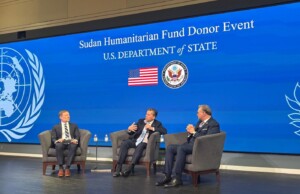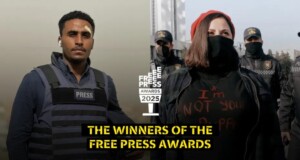Sudan Uprising: Political leaders detained preceding mass sit-ins on Sunday
Thousands of Sudanese took part in over 20 sit-ins in Khartoum, Omdurman, and Khartoum North on Sunday, demanding the immediate step-down of Al Bashir and his regime from power in response to calls of organisations which signed the Declaration of Freedom and Change.
 Protestors hold a sit-in to call for the step down of Omar al Bashir and his regime in Sudan (social media)
Protestors hold a sit-in to call for the step down of Omar al Bashir and his regime in Sudan (social media)
Thousands of Sudanese took part in over 20 sit-ins in Khartoum, Omdurman, and Khartoum North on Sunday, demanding the immediate step-down of Al Bashir and his regime from power in response to calls of organisations which signed the Declaration of Freedom and Change.

after he arrived at a peaceful sit-in
at El Sawra, Omdurman on January 28 2019
and told protesters over a megaphone
that their gathering was illegal
and violence would be used against them
(social media)
The sit-ins, organised by the Sudan Professionals Organisation and other signatories of the Declaration of Freedom and Change, took place in many squares of Greater Khartoum on Sunday. They were met by security forces which used excessive force, including batons and tear gas. Dozens of people calling for the fall of the regime were detained.
Security forces fired tear gas inside houses in the neighbourhoods of El Kalakla and Burri in Khartoum, and in various places in Omdurman.
Reports of an electricity blackout in Khartoum ahead of sit-ins on Sunday continue to be reported. Black outs in other cities in Sudan were also reported. One report by CNN reporter Yousra Elbagir yesterday morning that parts of Khartoum have electricity again.
In Wad Madani, capital of El Gezira state (neighbouring Khartoum state), a large sit-in took place at the Grand Market, where security forces attacked demonstrators using sticks, batons, and tear gas. They chased away demonstrators calling for the fall of the regime, who fled into neighbouring streets.
Detention of political leaders and journalists
The National Intelligence and Security Service (NISS) detained a number of political leaders hours after the Sudanese Professionals Association announced the organisation of sit-ins in Greater Khartoum on Sunday. Security officers held Mohamed Diaeldin, spokesman for the Baath Party, Faiza Nugud, and economist Dr Sidgi Kabello in Khartoum, and lawyer Hasan El Tayeb in Port Sudan.
Agents of the NISS also arrested a number of journalists on Sunday in Greater Khartoum.
They detained Iman Osman (editor) and Tarig Ali (correspondent in Kosti) of El Midan newspaper. Journalists Adam Mahdi from Nyala, capital of South Darfur, and Musab Mohamed and Amin Sinada from Port Sudan were also detained. Their colleagues Ageel Naeem, Kamal Karrar, Gurashi Awad, Adil Kolor, Ismail Bilal, and Mohamed Babikir, detained in December and earlier this month, are still being held.
The reporter of El Mijhar newspaper in eastern Sudan’s El Gedaref, Salman Mukhtar was summoned by NISS officers on Thursday, Friday, and Saturday. He was investigated for reporting on the demonstrations in El Gedaref and remained in the security offices for many hours before his release.
Newspaper banned
On Sunday, the security apparatus banned El Jareeda newspaper for the 17th time in a row and the 30th time since December 19, when protests began. Akhbar El Watan and El Tayyar newspapers were banned from publication on the same day.
The NISS has continued to subject some newspapers to prior censorship for more than six weeks. Yesterday, the Sudanese Journalists network said in a statement that the security apparatus has been forcing the newspapers and other media not to cover the news of the popular uprising, resorting to tricks such as increasing taxes on newspapers against the newspapers to hit their budgets, as well as threatening criminal proceedings against journalists to intimidate and terrorise them.
The network said in its statement that rusty security weapons will not discourage Sudanese journalists from moving forward in favour of the legitimate demands of our people for freedom, justice and democratic transition.
The RSF reported on January 22 that “the crackdown is reaching alarming levels, with RSF tallying more than 100 press freedom violations in the past month. They include 66 arrests of journalists, six cases of accreditation being withdrawn from the correspondents of foreign media (including Al Jazeera and the Turkish news agency Anadolu), and 34 seizures of newspaper issues.” The leading social networks meanwhile continue to be inaccessible except to those using VPN-type encrypted networks.
International
Protests were held yesterday in front of the White House in Washington DC, USA and in Trafalgar Square in London, UK, in solidarity with Sudanese people who want Al Bashir to step down along with his regime.
Correction 02-04-2019: This article initially quoted the Sudanese Translators for Change (STC) tweet which reported that sewage water was purposedly deposited in public squares. The next day, however, the STC account reported that the photo is assumed to be older than the current protests and they are investigating the issue.











 and then
and then